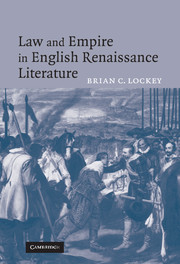Book contents
- Frontmatter
- Contents
- Acknowledgments
- Introduction: Romance and the ethics of expansion
- PART I ROMANCE AND LAW
- 1 Transnational justice and the genre of romance
- 2 Natural law and charitable intervention in Sir Philip Sidney's Old Arcadia
- 3 Natural law and corrupt lawyers: Riche, Roberts, Johnson, and Warner
- 4 Spenser's legalization of the Irish Conquest
- PART II THE PREROGATIVE COURTS AND THE CONQUEST WITHIN
- Conclusion: English law and the early modern romance
- Index
4 - Spenser's legalization of the Irish Conquest
Published online by Cambridge University Press: 22 September 2009
- Frontmatter
- Contents
- Acknowledgments
- Introduction: Romance and the ethics of expansion
- PART I ROMANCE AND LAW
- 1 Transnational justice and the genre of romance
- 2 Natural law and charitable intervention in Sir Philip Sidney's Old Arcadia
- 3 Natural law and corrupt lawyers: Riche, Roberts, Johnson, and Warner
- 4 Spenser's legalization of the Irish Conquest
- PART II THE PREROGATIVE COURTS AND THE CONQUEST WITHIN
- Conclusion: English law and the early modern romance
- Index
Summary
In Elizabethan Ireland, English administrators employed legal means to control and suppress Irish subjects and to confiscate their land. That Edmund Spenser writes at length on legal reform is therefore a notable, although not surprising, feature of his conflicted and often contradictory political treatise on the Irish Conquest, A View of the Present State of Ireland. Like other English officials in Ireland, Spenser encountered the Irish through the medium of the law. In 1581, not long after his arrival in Ireland, Spenser was appointed clerk of Faculties in the Irish Court of Chancery, an office which he held for seven years. Although he was frequently absent from the post, its description that it be filled by “one sufficient Clerk, being learned in the course of the Chancery” reveals that the office-holder had at least to have a functional knowledge of the law. In addition, correspondences and other documents which Spenser wrote as Lord Grey's secretary show that Spenser was often a witness to and even participated in the trials and executions of native Irish and Anglo-Irish rebels. In short, Spenser seems to have been familiar with the legal mechanisms which functioned to subdue the rebellious Irish populations.
In carrying out the task of using the law to “reform” the Irish, English administrators faced difficulties that contrasted in significant ways with Spain's experience in the Americas.
- Type
- Chapter
- Information
- Law and Empire in English Renaissance Literature , pp. 113 - 142Publisher: Cambridge University PressPrint publication year: 2006



